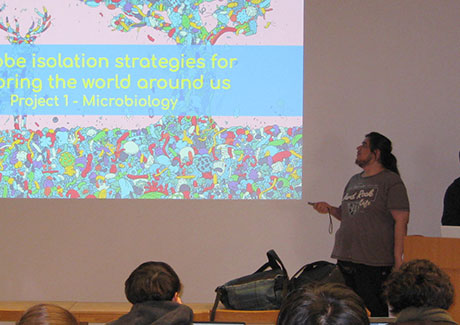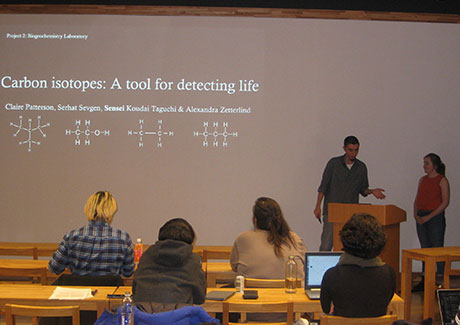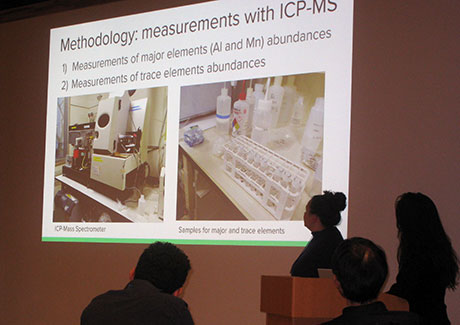Highly motivated graduate-level students from around the world joined their Tokyo Tech counterparts to complete the School on Evolution of Earth & Life (EEL2019), a Winter School program jointly hosted by the Department of Earth and Planetary Sciences (EPS) and the Earth-Life Science Institute (ELSI) on Ookayama Campus from December 2 to 6. After receiving over 60 applications from students at the California Institute of Technology, Massachusetts Institute of Technology, the Australian National University, and other top institutions in 20 countries and regions, an EPS-ELSI panel selected 15 outstanding students to participate in the intensive, five-day event.
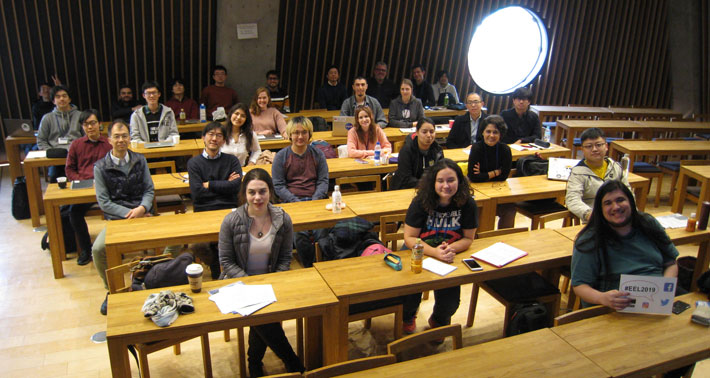
Participants at ELSI's Mishima Hall
The students spent days 1 and 2 on a geological excursion in the Tanzawa Mountains in Kanagawa Prefecture. The Japanese archipelago sits on or near the convergent boundaries of tectonic plates, offering valuable opportunities to study geological phenomena associated with plate subduction. The Tanzawa Mountains, located on the boundary where the Philippine Sea Plate collides with Japan's main island of Honshu, is a particularly inspiring setting to learn about island arc volcanism as well as evolution of the continental crust. Unsurprisingly, both the students and organizers were excited throughout the field trip.
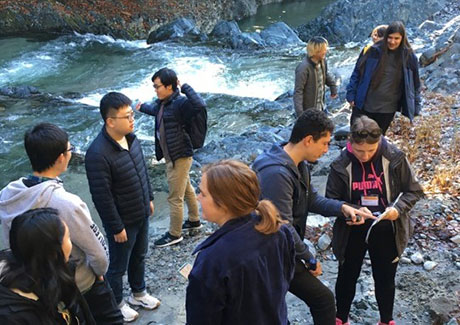
Geological field trip to Tanzawa Mountains
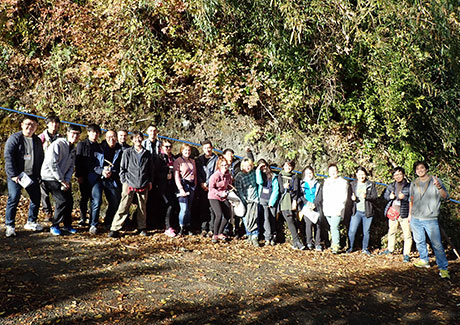
Standing on border of
Philippine Sea and North American Plates
To inform and motivate the participants further on days 3 and 4, special lectures were given by Professor Shogo Tachibana and Professor Yukio Isozaki, both from the University of Tokyo. Tachibana spoke about the two Hayabusas and Japan's space exploration missions, while, Isozaki shared his knowledge on the evolution of life from the viewpoint of Japanese geology. ELSI's Professor John Hernlund also spoke about the "Evolution of Solid Earth."
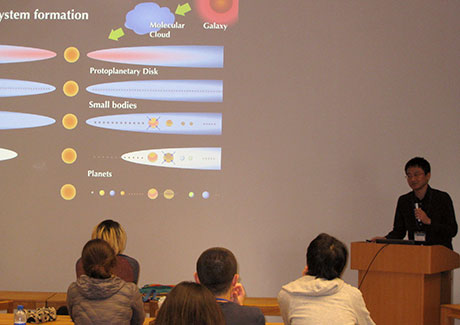
Tachibana's Origin of Solar System lecture
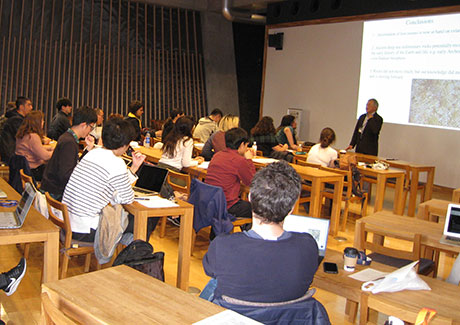
Isozaki delivering his lecture
The second half of the program was reserved for experiments and further research on one of five areas under the guidance of EPS and ELSI faculty:
Field & supervisors |
Highlights |
Microbiology
Assoc. Profs. Shawn McGlynn,
Kosuke Fujishima |
In preparation for more advanced geobiology techniques, essential basic biochemical techniques including nucleic acid gel electrophoresis analysis, protein activity assays, and bacterial cultures explored. |
Biogeochemistry
Asst. Profs. Alexis Gilbert,
Mayuko Nakagawa |
Understanding how we reconstruct the early Earth's environment and biosphere using stable isotopes. Analysis of sedimentary rock samples from over 2.5 billion years ago, related wet chemistry and mass spectrometry techniques. |
Earth's interior
Assoc. Prof. Kenji Ohta |
High pressure and high temperature experiments. Use of laser-heated diamond anvil cell to generate high Pressure-Temperature conditions in mineral physics lab, observation of pressure and temperature-induced phase transitions of minerals. |
Cosmochemistry
Prof. Tetsuya Yokoyama,
Asst. Prof. Makiko Haba, |
Determining trace element abundances in meteorite samples using Inductively Coupled Plasma Mass Spectrometry (ICP-MS) in a class-100 clean lab designed to handle precious extraterrestrial materials, obtain data to understand the chemical evolution of the early solar system. |
Planet formation
Prof. Shigeru Ida,
Assoc. Prof. Hidenori Genda |
Dynamical simulations on planet formation using a computer, e.g. orbital stability of multiple gas giant planets, using N-body simulation, or impacts between planets, using Smoothed Particle Hydrodynamics simulations. |
During the final presentations on Day 5, faculty members were impressed by the quality of data produced after only a few days of research and discussion.
Presentations by student groups
Overall, EEL2019 offered a unique opportunity for students from around the world to experience the environment of Japan and ELSI while providing Tokyo Tech students with a taste of joint international research. Tokyo Tech is looking forward to hosting the next Winter and Summer Schools.
. Any information published on this site will be valid in relation to Science Tokyo.







